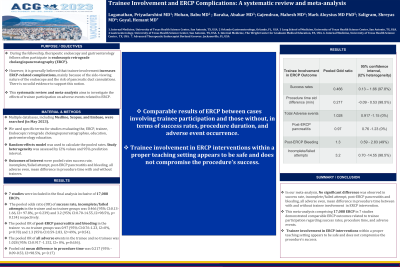Tuesday Poster Session
Category: Biliary/Pancreas
P2872 - Trainee Involvement and ERCP Complications: A Systematic Review and Meta-Analysis
Tuesday, October 24, 2023
10:30 AM - 4:00 PM PT
Location: Exhibit Hall

Has Audio

Priyadarshini Loganathan, MD
University of Texas Health Science Center
San Antonio, TX
Presenting Author(s)
Priyadarshini Loganathan, MD1, Babu Mohan, MD, MS2, Abakar Baraka, BA3, Mahesh Gajendran, MD, MPH3, Mark Aloysius, MD, PhD4, Shreyas Saligram, MD3, Hemant Goyal, MD5
1University of Texas Health Science Center, San Antonio, TX; 2University of Utah Health School of Medicine, Salt Lake City, UT; 3University of Texas Health Science Center at San Antonio, San Antonio, TX; 4SUNY Upstate Medical University, Syracuse, NY; 5Borland Groover, Jacksonville, FL
Introduction: During their fellowship, therapeutic endoscopy and gastroenterology fellows often participate in endoscopic retrograde cholangiopancreatography (ERCP). However, it is generally believed that trainee involvement increases ERCP-related complications, mainly because of the side-viewing nature of the endoscope and the risk of pancreatic duct cannulations. There is no solid evidence to support this notion. This systematic review and meta-analysis aims to investigate the effects of trainee participation on adverse events related to ERCP.
Methods: Medline, Scopus, and Embase databases were searched since inception to 31 May 2023 for studies evaluating the ERCP outcomes defined as success rates, procedure time, failed attempts, and adverse events with and without trainee participation. Random effect model was used to perform the meta-analysis , and heterogeneity was assessed using the I2 statistics.
Results: 7 studies were included in the final analysis inclusive of 17,088 ERCPs. The pooled odds ratio (OR) of success rate, incomplete/failed attempts in the trainee and no trainees groups was 0.466 (95% CI:0.13-1.66, I2= 97.8%, p= 0.239) and 3.2 (95% CI:0.70-14.55), I2=98.5%, p= 0.134) respectively. The pooled OR of post-ERCP pancreatitis and bleeding in the trainee vs. no trainees groups was 0.97 (95% CI:0.76-1.23, I2=0%, p=0.78) and 1.3 (95% CI:0.59-2.83, I2=49%, p=0.54). The pooled OR of all adverse events in the trainee and no trainees was 1.028 (95% CI:0.917 -1.152, I2= 0%, p=0.636). Pooled std mean difference in procedure time was 0.217 (95% -0.093-0.05, I2=98.5%, p= 0.17). (Table 1)
Discussion: This meta-analysis of 7 studies demonstrated comparable ERCP outcomes with trainee involvement vs. without trainees in regard to success rates, procedure time, and adverse events. Trainee involvement in ERCP interventions within a proper teaching setting is safe and does not compromise the procedure’s success.
Disclosures:
Priyadarshini Loganathan, MD1, Babu Mohan, MD, MS2, Abakar Baraka, BA3, Mahesh Gajendran, MD, MPH3, Mark Aloysius, MD, PhD4, Shreyas Saligram, MD3, Hemant Goyal, MD5. P2872 - Trainee Involvement and ERCP Complications: A Systematic Review and Meta-Analysis, ACG 2023 Annual Scientific Meeting Abstracts. Vancouver, BC, Canada: American College of Gastroenterology.
1University of Texas Health Science Center, San Antonio, TX; 2University of Utah Health School of Medicine, Salt Lake City, UT; 3University of Texas Health Science Center at San Antonio, San Antonio, TX; 4SUNY Upstate Medical University, Syracuse, NY; 5Borland Groover, Jacksonville, FL
Introduction: During their fellowship, therapeutic endoscopy and gastroenterology fellows often participate in endoscopic retrograde cholangiopancreatography (ERCP). However, it is generally believed that trainee involvement increases ERCP-related complications, mainly because of the side-viewing nature of the endoscope and the risk of pancreatic duct cannulations. There is no solid evidence to support this notion. This systematic review and meta-analysis aims to investigate the effects of trainee participation on adverse events related to ERCP.
Methods: Medline, Scopus, and Embase databases were searched since inception to 31 May 2023 for studies evaluating the ERCP outcomes defined as success rates, procedure time, failed attempts, and adverse events with and without trainee participation. Random effect model was used to perform the meta-analysis , and heterogeneity was assessed using the I2 statistics.
Results: 7 studies were included in the final analysis inclusive of 17,088 ERCPs. The pooled odds ratio (OR) of success rate, incomplete/failed attempts in the trainee and no trainees groups was 0.466 (95% CI:0.13-1.66, I2= 97.8%, p= 0.239) and 3.2 (95% CI:0.70-14.55), I2=98.5%, p= 0.134) respectively. The pooled OR of post-ERCP pancreatitis and bleeding in the trainee vs. no trainees groups was 0.97 (95% CI:0.76-1.23, I2=0%, p=0.78) and 1.3 (95% CI:0.59-2.83, I2=49%, p=0.54). The pooled OR of all adverse events in the trainee and no trainees was 1.028 (95% CI:0.917 -1.152, I2= 0%, p=0.636). Pooled std mean difference in procedure time was 0.217 (95% -0.093-0.05, I2=98.5%, p= 0.17). (Table 1)
Discussion: This meta-analysis of 7 studies demonstrated comparable ERCP outcomes with trainee involvement vs. without trainees in regard to success rates, procedure time, and adverse events. Trainee involvement in ERCP interventions within a proper teaching setting is safe and does not compromise the procedure’s success.
Disclosures:
Priyadarshini Loganathan indicated no relevant financial relationships.
Babu Mohan indicated no relevant financial relationships.
Abakar Baraka indicated no relevant financial relationships.
Mahesh Gajendran indicated no relevant financial relationships.
Mark Aloysius indicated no relevant financial relationships.
Shreyas Saligram indicated no relevant financial relationships.
Hemant Goyal: Aimloxy LLC – Consultant. API – Independent Contractor. Singla Innovations – Owner/Ownership Interest.
Priyadarshini Loganathan, MD1, Babu Mohan, MD, MS2, Abakar Baraka, BA3, Mahesh Gajendran, MD, MPH3, Mark Aloysius, MD, PhD4, Shreyas Saligram, MD3, Hemant Goyal, MD5. P2872 - Trainee Involvement and ERCP Complications: A Systematic Review and Meta-Analysis, ACG 2023 Annual Scientific Meeting Abstracts. Vancouver, BC, Canada: American College of Gastroenterology.
